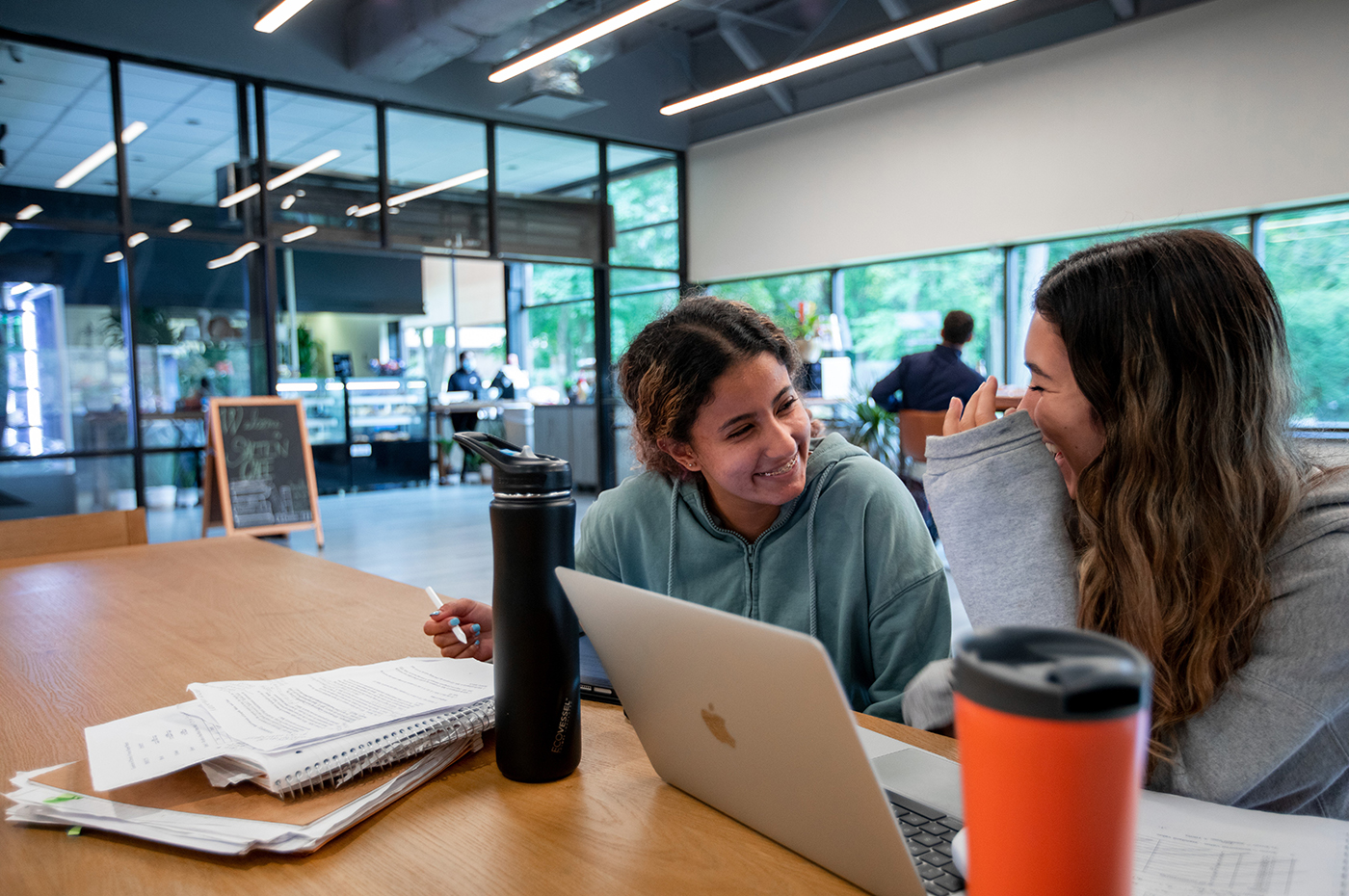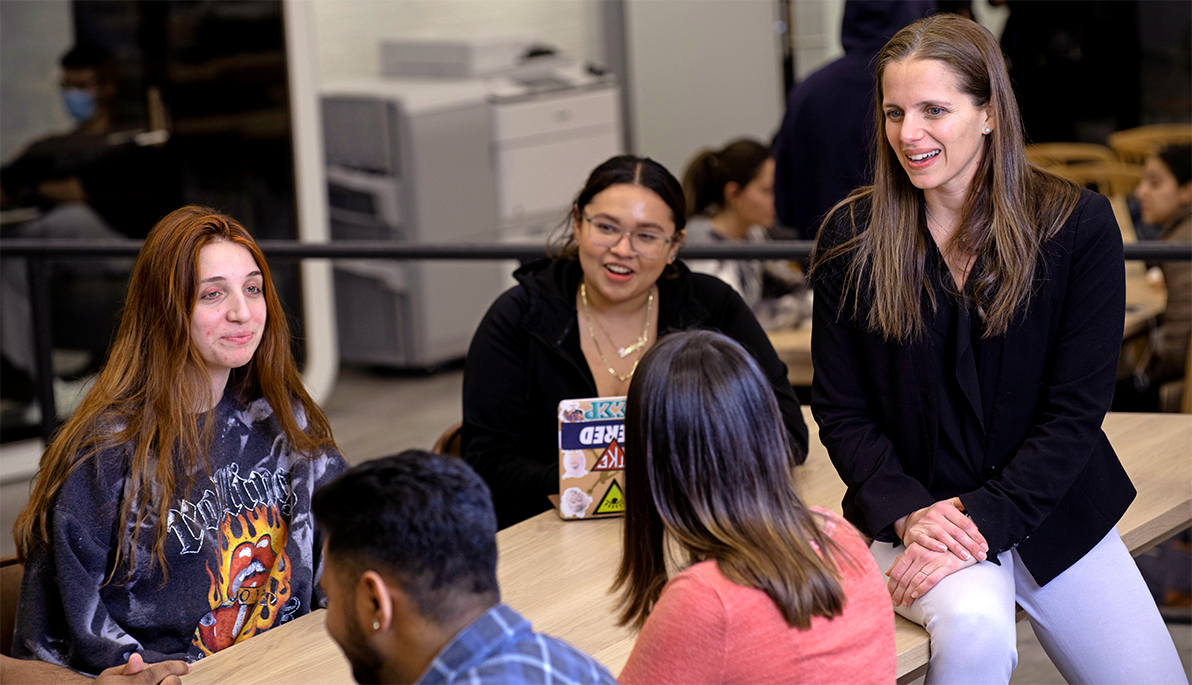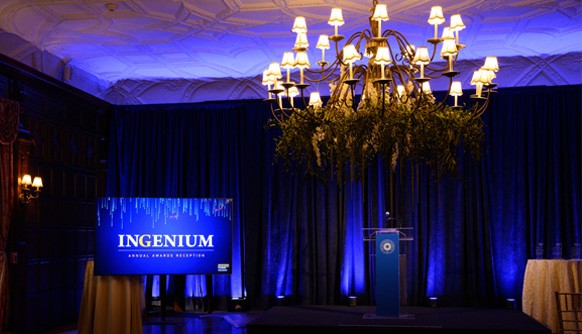News
You Can Count on Me
August 15, 2022
Mentorship and coaching programs at New York Tech help students feel supported every step of the way.
Nearly 90 percent of college graduates across the country had a mentor, receiving career advice from an on-campus resource. While faculty mentors often make up a large portion of those relationships, it’s also important to note that everyone is different—for example, first-generation and underrepresented minority students also highly value mentors who they identify as friends, family members, and staff.
To fully support its diverse and distinctive community, New York Tech has developed several mentorship and coaching programs offered at different times and on a variety of platforms to help meet students where they are, offering support and increasing student engagement—both markers that align with lifelong success.
Hit the Ground Running
New York Tech has developed three complementary programs on its New York campuses that target undergraduate students to help ensure they feel connected to the school and start—or get back—on the right path.

Launched last year, the First-Year GUIDE Program was created to offer students starting college during the pandemic an opportunity to engage with their school and make new friends. Incoming first-years are linked with Peer Success Guides (PSG)—upperclassmen who are trained to interact with their own small group of students, offering them guidance, fielding newcomer questions, and organizing social events.
“The experience of COVID amplified our understanding that students need to feel connected to thrive,” says Monika Rohde (M.A. '05), senior associate dean of undergraduate student success and advising. “Adding a PSG to their support team gives them the chance to connect with a peer who they may feel more relaxed with and who is trained to answer those small (but important) questions.”
[{module|box_20220815_youcancountonme_sidebar}]In creating the First-Year GUIDE Program, New York Tech wanted to offer a support system that would be complementary to those already in place.
“When designing the program, our research indicated that more first-year college students do not return due to nonacademic reasons, and that peer-level support is a proven approach to enhance students’ campus connectedness and social belonging,” says Tadiyos Gebre, director of academic enrichment. “Especially when considering the reality of remote learning and our commuter campus status, our team felt that it was essential to add this new pillar of support.”
The first semester of the First-Year GUIDE Program was a success, with more than 40 percent of the 700 matched mentees actively engaging with their PSG.
For students who are struggling academically, New York Tech offers two dedicated programs that provide personalized support to those who need help maintaining their institutional scholarships.
First is the iAchieve program, which is intended for second-semester freshmen whose grades have dropped below a certain level, while the Achieving Collegiate Excellence (ACE) program gives sophomores and juniors who did not meet their scholarship GPA renewal criteria the opportunity to keep their award as long as they participate in the program.
In both programs, students complete success modules developed by the academic success and enrichment team to help them build and finesse skills such as time management and metacognitive study techniques. But most impactful is the relationship with their assigned faculty or staff academic coach, who they connect with regularly throughout the semester.
“In addition to the emphasis on early support and academic assistance, academic coaches will spend the time getting to know the students and their challenges, which allows us to understand each individual student’s unique situation and offer tailored solutions,” says Rohde.
According to ongoing data analytics conducted by Research, Assessment, and Decision Support (RADS) to improve these efforts every year, both programs are doing a world of good. ACE, for example, is helping to reduce or eliminate retention gaps in certain demographic populations, as well as improving New York Tech’s four-year graduation rate—a figure that had been at a standstill for several years.
“I lost my scholarship in fall 2019 because of family problems, and my grades went way down,” says Yukta Dharmendrabhai Patel, who completed ACE in spring 2020. “ACE helped me so much with COVID stress and learning how to study better. Everyone motivated me a lot, and meeting other students who were in the same boat helped me know it was going to be okay.”
Patel’s grades jumped up a full GPA point in one semester, and she got her scholarship back. She graduates this spring with her bachelor’s degree in health sciences, after which she hopes to attend graduate school to become a physician’s assistant.
Paying It Forward
New York Tech is also in the process of launching a university-wide mentorship program that allows alumni to mentor students from their second year through graduate school.
“When we look at New York Tech’s strategic plan and our goals, high on the list are student support and retention, as well as being a student-centered institute of learning,” says Sabrina Polidoro, director of alumni relations. “We have first-year coaching through the Advising and Enrichment Center programs like ACE and iAchieve; academic assistance through the Writing Center, Math Resource Center, and more; and now we’ll have alumni mentorship as a third prong of support.”
Through this guided mentorship program, alumni will volunteer to connect with a mentee over the course of a semester or a year. New York Tech will provide talking points and goals to help give pairs direction, but the specifics of when and how the mentoring relationship takes shape is up to them.
“Ultimately, we’re asking alumni to volunteer a total of one day of their time—24 hours—to their mentee and their career development,” says Polidoro. “One day of your life can make a world of difference for our students as they discover career opportunities, grow personally and professionally, and build their network.”
Alumni will begin by submitting an online interest form to express the type of mentorship they’re interested in—such as résumé reviews, job shadowing, informational interviews, or general guidance—as well as what areas that appeal to them personally and professionally to facilitate matching.
“We don’t want the pairings to be completely linear, such as electrical engineering students always get paired with someone who majored in electrical engineering,” says Polidoro. “Academic interest will be a heavily weighted criterion, but we’ll also consider other experiences, like being a first-generation or international student or how someone identifies their race or gender. We want to make sure each relationship is a comfortable and compatible one.”
This kind of holistic mentoring program is mutually beneficial for all involved. Students get to have real-world interactions in the industries they’re considering, learning how to build relationships and seek out opportunities. Alumni can support their alma mater and the next generation of New York Tech graduates by sharing their time and their talent, while also growing their network and honing their leadership skills.
“We’re hopeful that this will be the start of lifelong relationships that grow beyond the college years,” says Polidoro. “Mentees can then pay it forward when they’re alumni, and the cycle will continue.”
The pilot alumni mentorship program is set to launch this fall with 50 mentor/mentee pairs for the first year. While the logistics are still being coordinated, the goal is to use a third-party online platform through a partnership with Graduway to allow alumni around the world to participate.
It Takes a Village
This holistic idea of student support is an institution-wide viewpoint that requires the hard work of many across campus.
“More than ever, we’re seeing the importance of a personalized approach to student success, and that’s our goal,” says Rohde. “We’re truly grateful that the institution as a whole supports this methodology, and we’re excited to see our students thrive because of it.”
[{module|box_20220815_youcancountonme_sidebar}]This article originally appeared in the Spring 2022 issue of New York Institute of Technology Magazine.
By Kathrin Havrilla


_Thumb.jpg)

